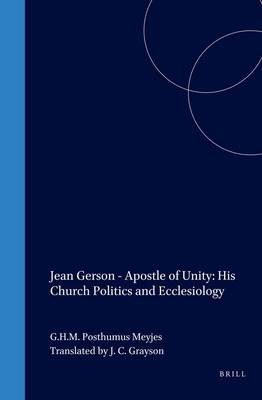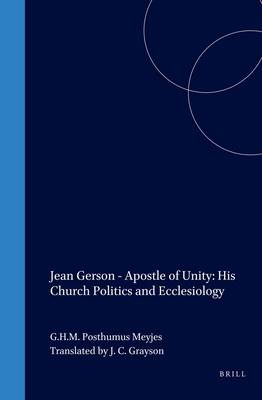
- Afhalen na 1 uur in een winkel met voorraad
- Gratis thuislevering in België vanaf € 30
- Ruim aanbod met 7 miljoen producten
- Afhalen na 1 uur in een winkel met voorraad
- Gratis thuislevering in België vanaf € 30
- Ruim aanbod met 7 miljoen producten
Jean Gerson - Apostle of Unity: His Church Politics and Ecclesiology
G H M Posthumus Meyjes
€ 236,95
+ 473 punten
Omschrijving
The first part of this study on the famous chancellor of the Paris University, contains a chronological survey of Gerson's position in the development of the church-politics of his days. It is shown how he became a convinced adherent of a conciliar solution of the Western schism, without betraying the idea of the Church as hierarchical entity.
In the second part his ecclesiological ideas are treated more systematically. Gerson's critical attitude towards canon lawyers and papal absolutism is examined, followed by an analysis of the background of his ideas about the Church as hierarchy and as mystical body, his conciliar thought, his concept of tradition, and his sources. The author tries to make clear that Gerson, far from being a radical, rather should be considered as a careful and conservative theologian. The book comprises a revised and extended version of an originally in Dutch written thesis, for which the author was awarded the Mallinckrodt-prize of the University of Groningen.
In the second part his ecclesiological ideas are treated more systematically. Gerson's critical attitude towards canon lawyers and papal absolutism is examined, followed by an analysis of the background of his ideas about the Church as hierarchy and as mystical body, his conciliar thought, his concept of tradition, and his sources. The author tries to make clear that Gerson, far from being a radical, rather should be considered as a careful and conservative theologian. The book comprises a revised and extended version of an originally in Dutch written thesis, for which the author was awarded the Mallinckrodt-prize of the University of Groningen.
Specificaties
Betrokkenen
- Auteur(s):
- Uitgeverij:
Inhoud
- Aantal bladzijden:
- 440
- Taal:
- Engels
- Reeks:
- Reeksnummer:
- nr. 94
Eigenschappen
- Productcode (EAN):
- 9789004112964
- Verschijningsdatum:
- 16/06/1999
- Uitvoering:
- Hardcover
- Formaat:
- Genaaid
- Afmetingen:
- 166 mm x 245 mm
- Gewicht:
- 966 g

Alleen bij Standaard Boekhandel
+ 473 punten op je klantenkaart van Standaard Boekhandel
Beoordelingen
We publiceren alleen reviews die voldoen aan de voorwaarden voor reviews. Bekijk onze voorwaarden voor reviews.









